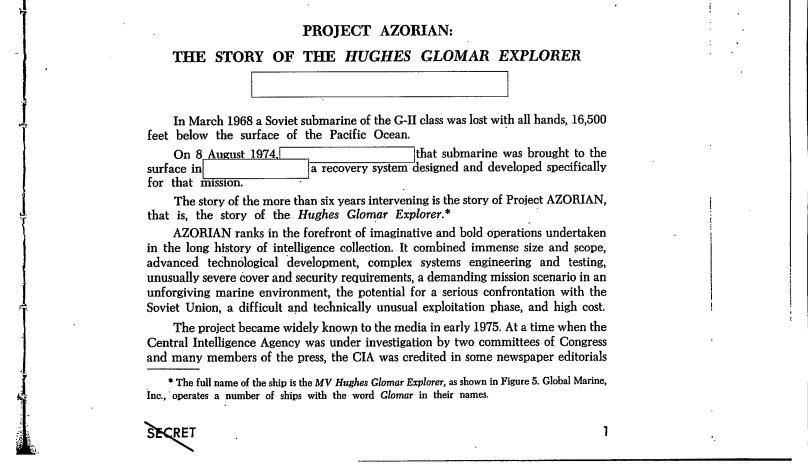“The Life of the Law” refers to the famous maxim of Oliver Wendell Holmes, who wrote “The life of the law has not been logic: it has been experience.” In other words, scratch any bit of abstract-sounding legalese, and you will probably find a human drama.
That was certainly true of a piece of reporting I just did for the program “Radiolab.” It started when I got curious about the term “Glomar Response,” a legal term of art for a type of exemption to releasing information under the Freedom of Information Act. While the exact wording varies from agency to agency, the Glomar Response allows a government agency confronted with a thorny FOIA request to step one level back from merely denying access because of classification. With a Glomar Response, government agencies can refuse to confirm or deny the very existence of the materials requested in order to keep the outlines of a program secret. Since it originated in the 1970s, the phrase “neither confirm nor deny” has entered the popular language as a signal of bureacratic dodginess or obsfucation.
Yet, as I would find out, the Glomar Response has a real story behind it and comes from a struggle, actually, to tell the truth under difficult circumstances. The first clue for me was just the name “Glomar.” It doesn’t scan as a real word: it sounds more like a made-up name of a hotel in Florida. What is a strange moniker like that doing on a piece of legalese?
I don’t want to give too much away, but the answer involves the CIA, a sunken Soviet submarine, a massive claw, some manganese, a crazy billionaire, and a statutory collision between operational secrecy and open government.
Secrecy and Cold War buffs might know about the name “Glomar” as a piece of lore or attached to one conspiracy theory or another. Its real backstory should be much better known, but the CIA has kept so many details a secret for so long, refusing to confirm or deny anything, that imagination and paranoia have filled in the blanks. Those who experienced Glomar’s backstory first-hand had to watch in frustration from the sidelines as inaccurate versions of their lived experience made the rounds.
Oddly, it’s only because of dogged historical research based on FOIA requests that the real story has started to come to light and I was able to interview some primary sources such as retired CIA officer David Sharp. His and other voices bring the true human dilemma behind the Glomar mission and Glomar Response to life. I’m honored these men are willing to go on the record; even 40 years after the fact, it’s still a big step for anyone who’s dedicated their careers to secret government operations. But at some point, if the true stories behind secrets are not told, we can’t understand where we come from. Without the lives behind it, law itself remains a mystery, and that’s never a good thing.
Julia Barton is a reporter and editor for Life of the Law.









